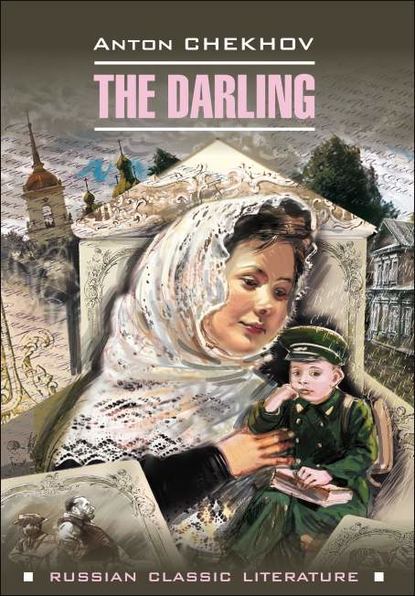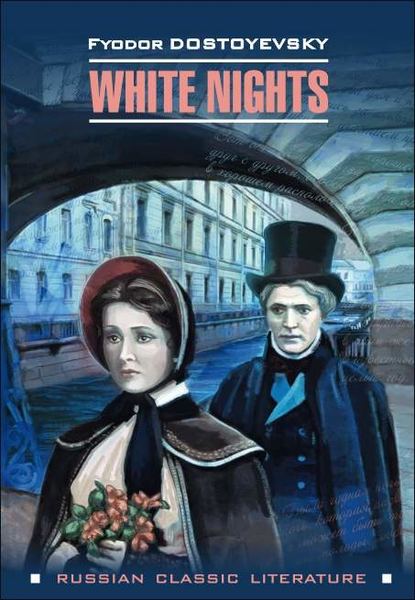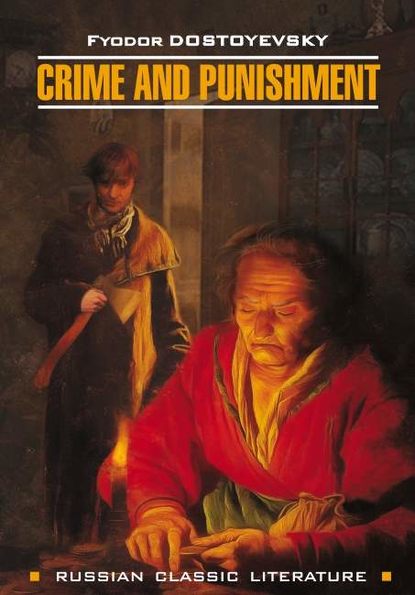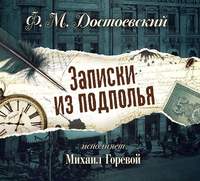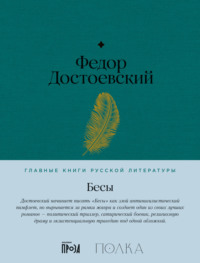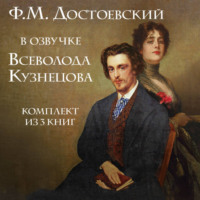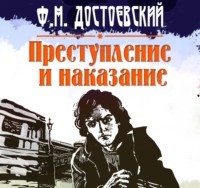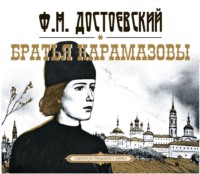
Полная версия
The idiot / Идиот
“At last her rags became so tattered and torn that she was ashamed of appearing in the village any longer. The children used to pelt her with mud; so she begged to be taken on as assistant cowherd, but the cowherd would not have her. Then she took to helping him without leave; and he saw how valuable her assistance was to him, and did not drive her away again; on the contrary, he occasionally gave her the remnants of his dinner, bread and cheese. He considered that he was being very kind. When the mother died, the village parson was not ashamed to hold Marie up to public derision and shame. Marie was standing at the coffin’s head, in all her rags, crying.
“A crowd of people had collected to see how she would cry. The parson, a young fellow ambitious of becoming a great preacher, began his sermon and pointed to Marie. ‘there,’ he said, ‘there is the cause of the death of this venerable woman’ – (which was a lie, because she had been ill for at least two years) – ‘there she stands before you, and dares not lift her eyes from the ground, because she knows that the finger of God is upon her. Look at her tatters and rags – the badge of those who lose their virtue. Who is she? her daughter!’ and so on to the end.
“And just fancy, this infamy pleased them, all of them, nearly. Only the children had altered – for then they were all on my side and had learned to love Marie.
“This is how it was: I had wished to do something for Marie; I longed to give her some money, but I never had a farthing while I was there. But I had a little diamond pin, and this I sold to a travelling pedlar; he gave me eight francs for it – it was worth at least forty.
“I long sought to meet Marie alone; and at last I did meet her, on the hillside beyond the village. I gave her the eight francs and asked her to take care of the money because I could get no more; and then I kissed her and said that she was not to suppose I kissed her with any evil motives or because I was in love with her, for that I did so solely out of pity for her, and because from the first I had not accounted her as guilty so much as unfortunate. I longed to console and encourage her somehow, and to assure her that she was not the low, base thing which she and others strove to make out; but I don’t think she understood me. She stood before me, dreadfully ashamed of herself, and with downcast eyes; and when I had finished she kissed my hand. I would have kissed hers, but she drew it away. Just at this moment the whole troop of children saw us. (I found out afterwards that they had long kept a watch upon me.) They all began whistling and clapping their hands, and laughing at us. Marie ran away at once; and when I tried to talk to them, they threw stones at me. All the village heard of it the same day, and Marie’s position became worse than ever. The children would not let her pass now in the streets, but annoyed her and threw dirt at her more than before. They used to run after her – she racing away with her poor feeble lungs panting and gasping, and they pelting her and shouting abuse at her.
“Once I had to interfere by force; and after that I took to speaking to them every day and whenever I could. Occasionally they stopped and listened; but they teased Marie all the same.
“I told them how unhappy Marie was, and after a while they stopped their abuse of her, and let her go by silently. Little by little we got into the way of conversing together, the children and I. I concealed nothing from them, I told them all. They listened very attentively and soon began to be sorry for Marie. At last some of them took to saying ‘Good-morning’ to her, kindly, when they met her. It is the custom there to salute anyone you meet with ‘Good-morning’ whether acquainted or not. I can imagine how astonished Marie was at these first greetings from the children.
“Once two little girls got hold of some food and took it to her, and came back and told me. They said she had burst into tears, and that they loved her very much now. Very soon after that they all became fond of Marie, and at the same time they began to develop the greatest affection for myself. They often came to me and begged me to tell them stories. I think I must have told stories well, for they did so love to hear them. At last I took to reading up interesting things on purpose to pass them on to the little ones, and this went on for all the rest of my time there, three years. Later, when everyone – even Schneider – was angry with me for hiding nothing from the children, I pointed out how foolish it was, for they always knew things, only they learnt them in a way that soiled their minds but not so from me. One has only to remember one’s own childhood to admit the truth of this. But nobody was convinced… It was two weeks before her mother died that I had kissed Marie; and when the clergyman preached that sermon the children were all on my side.
“When I told them what a shame it was of the parson to talk as he had done, and explained my reason, they were so angry that some of them went and broke his windows with stones. Of course I stopped them, for that was not right, but all the village heard of it, and how I caught it for spoiling the children! Everyone discovered now that the little ones had taken to being fond of Marie, and their parents were terribly alarmed; but Marie was so happy. The children were forbidden to meet her; but they used to run out of the village to the herd and take her food and things;
and sometimes just ran off there and kissed her, and said, ‘Je vous aime, Marie!’ and then trotted back again. They imagined that I was in love with Marie, and this was the only point on which I did not undeceive them, for they got such enjoyment out of it. And what delicacy and tenderness they showed!
“In the evening I used to walk to the waterfall. There was a spot there which was quite closed in and hidden from view by large trees; and to this spot the children used to come to me. They could not bear that their dear Leon should love a poor girl without shoes to her feet and dressed all in rags and tatters. So, would you believe it, they actually clubbed together, somehow, and bought her shoes and stockings, and some linen, and even a dress! I can’t understand how they managed it, but they did it, all together. When I asked them about it they only laughed and shouted, and the little girls clapped their hands and kissed me. I sometimes went to see Marie secretly, too. She had become very ill, and could hardly walk. She still went with the herd, but could not help the herdsman any longer. She used to sit on a stone near, and wait there almost motionless all day, till the herd went home. Her consumption was so advanced, and she was so weak, that she used to sit with closed eyes, breathing heavily. Her face was as thin as a skeleton’s, and sweat used to stand on her white brow in large drops. I always found her sitting just like that. I used to come up quietly to look at her; but Marie would hear me, open her eyes, and tremble violently as she kissed my hands. I did not take my hand away because it made her happy to have it, and so she would sit and cry quietly. Sometimes she tried to speak; but it was very difficult to understand her. She was almost like a madwoman, with excitement and ecstasy, whenever I came. Occasionally the children came with me; when they did so, they would stand some way off and keep guard over us, so as to tell me if anybody came near. This was a great pleasure to them.
“When we left her, Marie used to relapse at once into her old condition, and sit with closed eyes and motionless limbs. One day she could not go out at all, and remained at home all alone in the empty hut; but the children very soon became aware of the fact, and nearly all of them visited her that day as she lay alone and helpless in her miserable bed.
“For two days the children looked after her, and then, when the village people got to know that Marie was really dying, some of the old women came and took it in turns to sit by her and look after her a bit. I think they began to be a little sorry for her in the village at last; at all events they did not interfere with the children any more, on her account.
“Marie lay in a state of uncomfortable delirium the whole while; she coughed dreadfully. The old women would not let the children stay in the room; but they all collected outside the window each morning, if only for a moment, and shouted ‘Bon jour, notre bonne Marie!’ and Marie no sooner caught sight of, or heard them, and she became quite animated at once, and, in spite of the old women, would try to sit up and nod her head and smile at them, and thank them. The little ones used to bring her nice things and sweets to eat, but she could hardly touch anything. Thanks to them, I assure you, the girl died almost perfectly happy. She almost forgot her misery, and seemed to accept their love as a sort of symbol of pardon for her offence, though she never ceased to consider herself a dreadful sinner. They used to flutter at her window just like little birds, calling out: ‘Nous t’aimons, Marie!’
“She died very soon; I had thought she would live much longer. The day before her death I went to see her for the last time, just before sunset. I think she recognized me, for she pressed my hand.
“Next morning they came and told me that Marie was dead. The children could not be restrained now; they went and covered her coffin with flowers, and put a wreath of lovely blossoms on her head. The pastor did not throw any more shameful words at the poor dead woman; but there were very few people at the funeral. However, when it came to carrying the coffin, all the children rushed up, to carry it themselves. Of course they could not do it alone, but they insisted on helping, and walked alongside and behind, crying.
“They have planted roses all round her grave, and every year they look alter the flowers and make Marie’s resting-place as beautiful as they can. I was in ill odour after all this with the parents of the children, and especially with the parson and schoolmaster. Schneider was obliged to promise that I should not meet them and talk to them; but we conversed from a distance by signs, and they used to write me sweet little notes. Afterwards I came closer than ever to those little souls, but even then it was very dear to me, to have them so fond of me.
“Schneider said that I did the children great harm by my pernicious ‘system’; what nonsense that was! And what did he mean by my system? He said afterwards that he believed I was a child myself – just before I came away. ‘You have the form and face of an adult’ he said, ‘but as regards soul, and character, and perhaps even intelligence, you are a child in the completest sense of the word, and always will be, if you live to be sixty.’ I laughed very much, for of course that is nonsense. But it is a fact that I do not care to be among grown-up people and much prefer the society of children. However kind people may be to me, I never feel quite at home with them, and am always glad to get back to my little companions. Now my companions have always been children, not because I was a child myself once, but because young things attract me. On one of the first days of my stay in Switzerland, I was strolling about alone and miserable, when I came upon the children rushing noisily out of school, with their slates and bags, and books, their games, their laughter and shouts – and my soul went out to them. I stopped and laughed happily as I watched their little feet moving so quickly. Girls and boys, laughing and crying; for as they went home many of them found time to fight and make peace, to weep and play. I forgot my troubles in looking at them. And then, all those three years, I tried to understand why men should be for ever tormenting themselves. I lived the life of a child there, and thought I should never leave the little village; indeed, I was far from thinking that I should ever return to Russia. But at last I recognized the fact that Schneider could not keep me any longer. And then something so important happened, that Schneider himself urged me to depart. I am going to see now if can get good advice about it. Perhaps my lot in life will be changed; but that is not the principal thing. The principal thing is the entire change that has already come over me. I left many things behind me – too many. They have gone. On the journey I said to myself, ‘I am going into the world of men. I don’t know much, perhaps, but a new life has begun for me.’ I made up my mind to be honest, and steadfast in accomplishing my task. Perhaps I shall meet with troubles and many disappointments, but I have made up my mind to be polite and sincere to everyone; more cannot be asked of me. People may consider me a child if they like. I am often called an idiot, and at one time I certainly was so ill that I was nearly as bad as an idiot; but I am not an idiot now. How can I possibly be so when I know myself that I am considered one?
“When I received a letter from those dear little souls, while passing through Berlin, I only then realized how much I loved them. It was very, very painful, getting that first little letter. How melancholy they had been when they saw me off! For a month before, they had been talking of my departure and sorrowing over it; and at the waterfall, of an evening, when we parted for the night, they would hug me so tight and kiss me so warmly, far more so than before. And every now and then they would turn up one by one when I was alone, just to give me a kiss and a hug, to show their love for me. The whole flock went with me to the station, which was about a mile from the village, and every now and then one of them would stop to throw his arms round me, and all the little girls had tears in their voices, though they tried hard not to cry. As the train steamed out of the station, I saw them all standing on the platform waving to me and crying ‘Hurrah!’ till they were lost in the distance.
“I assure you, when I came in here just now and saw your kind faces (I can read faces well) my heart felt light for the first time since that moment of parting. I think I must be one of those who are born to be in luck, for one does not often meet with people whom one feels he can love from the first sight of their faces; and yet, no sooner do I step out of the railway carriage than I happen upon you!
“I know it is more or less a shamefaced thing to speak of one’s feelings before others; and yet here am I talking like this to you, and am not a bit ashamed or shy. I am an unsociable sort of fellow and shall very likely not come to see you again for some time;
but don’t think the worse of me for that. It is not that I do not value your society; and you must never suppose that I have taken offence at anything.
“You asked me about your faces, and what I could read in them; I will tell you with the greatest pleasure. You, Adelaida Ivanovna, have a very happy face; it is the most sympathetic of the three. Not to speak of your natural beauty, one can look at your face and say to one’s self, ‘she has the face of a kind sister.’ You are simple and merry, but you can see into another’s heart very quickly. That’s what I read in your face.
“You too, Alexandra Ivanovna, have a very lovely face; but I think you may have some secret sorrow. Your heart is undoubtedly a kind, good one, but you are not merry. There is a certain suspicion of ‘shadow’ in your face, like in that of Holbein’s Madonna in Dresden. So much for your face. Have I guessed right?
“As for your face, Lizabetha Prokofievna, I not only think, but am perfectly SURE, that you are an absolute child – in all, in all, mind, both good and bad-and in spite of your years. Don’t be angry with me for saying so; you know what my feelings for children are. And do not suppose that I am so candid out of pure simplicity of soul. Oh dear no, it is by no means the case! Perhaps I have my own very profound object in view.”
VII
When the prince ceased speaking all were gazing merrily at him – even Aglaya; but Lizabetha Prokofievna looked the jolliest of all.
“Well!” she cried, “we HAVE ‘put him through his paces,’ with a vengeance! My dears, you imagined, I believe, that you were about to patronize this young gentleman, like some poor protege picked up somewhere, and taken under your magnificent protection. What fools we were, and what a specially big fool is your father! Well done, prince! I assure you the general actually asked me to put you through your paces, and examine you. As to what you said about my face, you are absolutely correct in your judgment. I am a child, and know it. I knew it long before you said so; you have expressed my own thoughts. I think your nature and mine must be extremely alike, and I am very glad of it. We are like two drops of water, only you are a man and I a woman, and I’ve not been to Switzerland, and that is all the difference between us.”
“Don’t be in a hurry, mother; the prince says that he has some motive behind his simplicity,” cried Aglaya.
“Yes, yes, so he does,” laughed the others.
“Oh, don’t you begin bantering him,” said mamma. “He is probably a good deal cleverer than all three of you girls put together. We shall see. Only you haven’t told us anything about Aglaya yet, prince; and Aglaya and I are both waiting to hear.”
“I cannot say anything at present. I’ll tell you afterwards.”
“Why? Her face is clear enough, isn’t it?”
“Oh yes, of course. You are very beautiful, Aglaya Ivanovna, so beautiful that one is afraid to look at you.”
“Is that all? What about her character?” persisted Mrs. Epanchin.
“It is difficult to judge when such beauty is concerned. I have not prepared my judgment. Beauty is a riddle.”
“That means that you have set Aglaya a riddle!” said Adelaida. “Guess it, Aglaya! But she’s pretty, prince, isn’t she?”
“Most wonderfully so,” said the latter, warmly, gazing at Aglaya with admiration. “Almost as lovely as Nastasia Philipovna, but quite a different type.”
All present exchanged looks of surprise.
“As lovely as WHO?” said Mrs. Epanchin. “As NASTASIA PHILIPOVNA? Where have you seen Nastasia Philipovna? What Nastasia Philipovna?”
“Gavrila Ardalionovitch showed the general her portrait just now.”
“How so? Did he bring the portrait for my husband?”
“Only to show it. Nastasia Philipovna gave it to Gavrila Ardalionovitch today, and the latter brought it here to show to the general.”
“I must see it!” cried Mrs. Epanchin. “Where is the portrait? If she gave it to him, he must have it; and he is still in the study. He never leaves before four o’clock on Wednesdays. Send for Gavrila Ardalionovitch at once. No, I don’t long to see HIM so much. Look here, dear prince, BE so kind, will you? Just step to the study and fetch this portrait! Say we want to look at it. Please do this for me, will you?”
“He is a nice fellow, but a little too simple,” said Adelaida, as the prince left the room.
“He is, indeed,” said Alexandra; “almost laughably so at times.” Neither one nor the other seemed to give expression to her full thoughts.
“He got out of it very neatly about our faces, though,” said Aglaya. He flattered us all round, even mamma.”
“Nonsense” cried the latter. “He did not flatter me. It was I who found his appreciation flattering. I think you are a great deal more foolish than he is. He is simple, of course, but also very knowing. Just like myself.”
“How stupid of me to speak of the portrait,” thought the prince as he entered the study, with a feeling of guilt at his heart, “and yet, perhaps I was right after all.” He had an idea, unformed as yet, but a strange idea.
Gavrila Ardalionovitch was still sitting in the study, buried in a mass of papers. He looked as though he did not take his salary from the public company, whose servant he was, for a sinecure.
He grew very wroth and confused when the prince asked for the portrait, and explained how it came about that he had spoken of it.
“Oh, curse it all,” he said; “what on earth must you go blabbing for? You know nothing about the thing, and yet – idiot!” he added, muttering the last word to himself in irrepressible rage.
“I am very sorry; I was not thinking at the time. I merely said that Aglaya was almost as beautiful as Nastasia Philipovna.”
Gania asked for further details; and the prince once more repeated the conversation. Gania looked at him with ironical contempt the while.
“Nastasia Philipovna,” he began, and there paused; he was clearly much agitated and annoyed. The prince reminded him of the portrait.
“Listen, prince,” said Gania, as though an idea had just struck him, “I wish to ask you a great favour, and yet I really don’t know —”
He paused again, he was trying to make up his mind to something, and was turning the matter over. The prince waited quietly. Once more Gania fixed him with intent and questioning eyes.
“Prince,” he began again, “they are rather angry with me, in there, owing to a circumstance which I need not explain, so that I do not care to go in at present without an invitation. I particularly wish to speak to Aglaya, but I have written a few words in case I shall not have the chance of seeing her” (here the prince observed a small note in his hand), “and I do not know how to get my communication to her. Don’t you think you could undertake to give it to her at once, but only to her, mind, and so that no one else should see you give it? It isn’t much of a secret, but still – Well, will you do it?”
“I don’t quite like it,” replied the prince.
“Oh, but it is absolutely necessary for me,” Gania entreated. “Believe me, if it were not so, I would not ask you; how else am I to get it to her? It is most important, dreadfully important!”
Gania was evidently much alarmed at the idea that the prince would not consent to take his note, and he looked at him now with an expression of absolute entreaty.
“Well, I will take it then.”
“But mind, nobody is to see!” cried the delighted Gania “And of course I may rely on your word of honour, eh?”
“I won’t show it to anyone,” said the prince.
“The letter is not sealed —” continued Gania, and paused in confusion.
“Oh, I won’t read it,” said the prince, quite simply.
He took up the portrait, and went out of the room. Gania, left alone, clutched his head with his hands.
“One word from her,” he said, “one word from her, and I may yet be free.”
He could not settle himself to his papers again, for agitation and excitement, but began walking up and down the room from corner to corner.
The prince walked along, musing. He did not like his commission, and disliked the idea of Gania sending a note to Aglaya at all; but when he was two rooms distant from the drawing-room, where they all were, he stopped a though recalling something; went to the window, nearer the light, and began to examine the portrait in his hand.
He longed to solve the mystery of something in the face Nastasia Philipovna, something which had struck him as he looked at the portrait for the first time; the impression had not left him. It was partly the fact of her marvellous beauty that struck him, and partly something else. There was a suggestion of immense pride and disdain in the face almost of hatred, and at the same time something confiding and very full of simplicity. The contrast aroused a deep sympathy in his heart as he looked at the lovely face. The blinding loveliness of it was almost intolerable, this pale thin face with its flaming eyes; it was a strange beauty.
The prince gazed at it for a minute or two, then glanced around him, and hurriedly raised the portrait to his lips. When, a minute after, he reached the drawing-room door, his face was quite composed. But just as he reached the door he met Aglaya coming out alone.
“Gavrila Ardalionovitch begged me to give you this,” he said, handing her the note.
Aglaya stopped, took the letter, and gazed strangely into the prince’s eyes. There was no confusion in her face; a little surprise, perhaps, but that was all. By her look she seemed merely to challenge the prince to an explanation as to how he and Gania happened to be connected in this matter. But her expression was perfectly cool and quiet, and even condescending.
So they stood for a moment or two, confronting one another. At length a faint smile passed over her face, and she passed by him without a word.
Mrs. Epanchin examined the portrait of Nastasia Philipovna for some little while, holding it critically at arm’s length.


